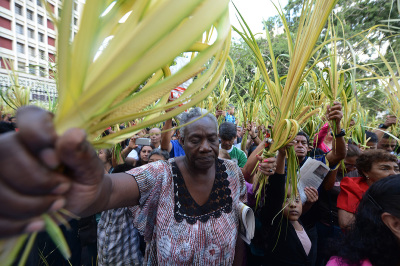Liturgical calendar: A discipleship resource

During my ever-lengthening pilgrimage as a disciple of Jesus (69 years) and a minister of His Gospel (59 years), I have been increasingly impressed with the opportunities provided by the Liturgical Calendar to help teach and impart vitally important Gospel truths. This fact is indicative of growth in my spiritual perspective and my overcoming a “blind spot” in my own spiritual background.
At this point, a brief word of explanation may be helpful. I was reared in a home with a Christian mother who from my earliest memories taught me that God loved me, Jesus died on the cross for me, and that He had a tailor-made plan for my life that was the source of all meaning and purpose for my existence (Ps. 139:13-16; Rom. 12:1-2). Being a Boston native, she was a conservative Northern Baptist married to a token, lost Texas Methodist she met while he was serving in the U.S. Navy during World War II.
My mother later told me that when she married my father (she was 19 and he was 21 in 1943, and he was already assigned to go back to the Pacific that year), she had no idea she was marrying a state. Upon his return from the Pacific in February 1946, he wired her to meet him in Galveston, Texas, for a second honeymoon. I was born 9 months later, part of the first-year crop of the famous “Baby Boom” (78 million babies born between 1946 and 1964).
My mother took me, along with my younger brother, to a new Southern Baptist Church planted as a mission effort in our Houston neighborhood in 1948. Through the men of that church reaching out to my father and inviting him to a Billy Graham Crusade in 1952, my father was saved and eventually became a deacon and Sunday School Superintendent in our burgeoning church. During my boyhood, the church grew from about 250 average attendance to approximately 1,000 people every Sunday.
I am forever grateful for that spiritual heritage and cherish it.
My home church was based on the inerrancy of Holy Scripture and the fact that every Christian was to do his best, individually and corporately through the church, to fulfill the Great Commission. We were deeply committed to evangelism and missions.
However, there was a big “blind spot.” For all practical purposes, our church and the denomination that birthed it — Southern Baptists — saw church history as ending with the death of the apostles — and resumed in 1519 when Martin Luther nailed his 95 theses to the Wittenberg church door. Everything between the first and 16th centuries was considered the “dark ages.”
Consequently, I knew next to nothing about the Liturgical Calendar (that was Roman Catholic and thus verboten). I knew nothing of the rich theological and social justice condition of Roman Catholicism.
I am extremely grateful for Dr. Paul Ramsey’s tutelage when I was a Princeton undergraduate in introducing me to Augustine and Thomas Aquinas — 'as well as Papal Encyclicals such as Centesimus Annus and Rerum Novarum.
As I said at the beginning of this column, my continuing walk as a “Christ-follower” has led me to overcome that “blind spot” in my Christian experience and to come to a new appreciation for the great opportunities afforded by the Liturgical Calendar for helping both believers and non-believers understand the foundational truths of the Christian faith.
As a Baptist Evangelical, while completely rejecting any sacramental understanding of the Liturgical Calendar, I do believe it offers great pedagogical opportunities to proclaim and teach the essential truths of the Christian faith.
We must remember that the Liturgical Calendar was developed at a time in church history when the vast majority of parishioners could not read or write and what they heard from medieval pulpits was largely in Latin, a language most of them could not understand. So, the visual and symbolic and their appeal to multiple sensory modes surely helped to cement these biblical stories and the truths behind them in their memories. After all, modern educational research has amply demonstrated that engaging multiple senses enhance retention. For example, research shows that we retain 50% of what we hear and 80% of what we both hear and write down (a great argument for students taking notes on lectures!).
We have just in recent months observed several supremely important events memorialized by the Liturgical Calendar. Here is a partial list:
1. CHRISTMAS (Celebrating the greatest gift ever given, the birth of Jesus, the Christ. John 1:14).
2. PALM SUNDAY (The Sunday before Easter, commemorating the beginning of the last week of Jesus’ earthly life.)
3. MAUNDY THURSDAY (The Thursday of Holy Week, commemorating the Last Supper and Jesus’ prayer in the Garden of Gethsemane, i.e. “nevertheless, not my will, but thy will, be done”).
4. GOOD FRIDAY (The commemoration of Jesus as the Great High Priest sacrificing Himself on the Cross for the sins of mankind.)
5. EASTER (The celebration of Jesus’ resurrection and the resulting empty tomb. Traditionally, the Easter season lasts until Pentecost Sunday.)
6. ASCENSION DAY (Observed 40 days after Easter, celebrating Jesus’ ascension back into heaven after His resurrection.)
7. PENTECOST (Observed seven weeks after Easter, celebrating the coming of the Holy Spirit in a new and mighty way to convict, instruct and inspire Christians from Pentecost forward until Jesus comes.)
Observing these Days on the Liturgical Calendar in recent years has blessed me immensely and the lives of those who have observed them with me. For lack of a better explanation, I believe these days of consummation and celebration in corporate worship speak to the “right side” of our brain and reach us in places beyond the familiar left-brain linear self.
Based on my experience and observation, I would encourage my fellow believers to embrace the opportunities provided by the Liturgical Calendar to deepen their own faith as well as providing a powerful multisensory witness to the comprehensive nature of our Savior’s triumph over the world, the flesh, and the devil.
Dr. Richard Land, BA (Princeton, magna cum laude); D.Phil. (Oxford); Th.M (New Orleans Seminary). Dr. Land served as President of Southern Evangelical Seminary from July 2013 until July 2021. Upon his retirement, he was honored as President Emeritus and he continues to serve as an Adjunct Professor of Theology & Ethics. Dr. Land previously served as President of the Southern Baptist Convention's Ethics & Religious Liberty Commission (1988-2013) where he was also honored as President Emeritus upon his retirement. Dr. Land has also served as an Executive Editor and columnist for The Christian Post since 2011.
Dr. Land explores many timely and critical topics in his daily radio feature, “Bringing Every Thought Captive,” and in his weekly column for CP.



























